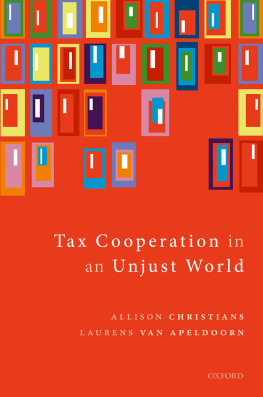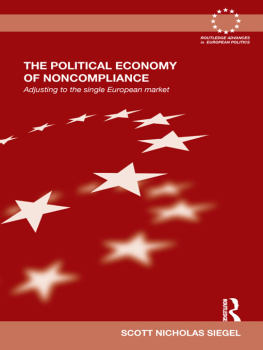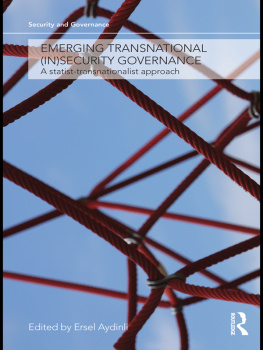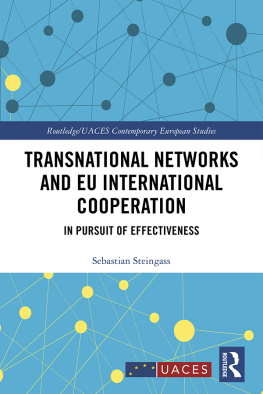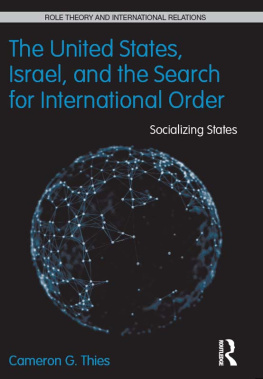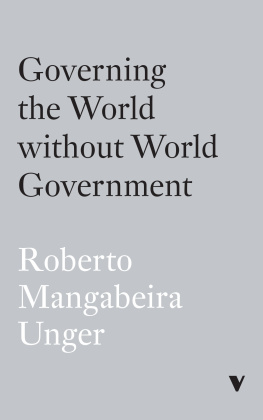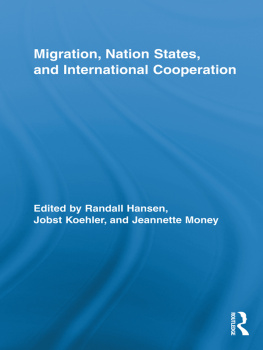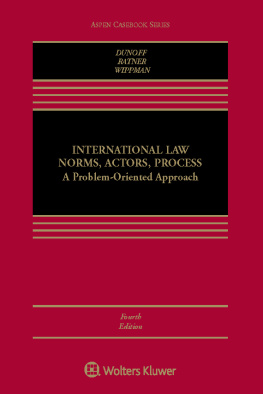Tax Cooperation in an Unjust World

Great Clarendon Street, Oxford, OX2 6DP,
United Kingdom
Oxford University Press is a department of the University of Oxford. It furthers the Universitys objective of excellence in research, scholarship, and education by publishing worldwide. Oxford is a registered trade mark of Oxford University Press in the UK and in certain other countries
Allison Christians and Laurens van Apeldoorn 2021
The moral rights of the authors have been asserted
First Edition published in 2021
Impression: 1
All rights reserved. No part of this publication may be reproduced, stored in a retrieval system, or transmitted, in any form or by any means, without the prior permission in writing of Oxford University Press, or as expressly permitted by law, by licence or under terms agreed with the appropriate reprographics rights organization. Enquiries concerning reproduction outside the scope of the above should be sent to the Rights Department, Oxford University Press, at the address above
You must not circulate this work in any other form and you must impose this same condition on any acquirer
Public sector information reproduced under Open Government Licence v3.0
(http://www.nationalarchives.gov.uk/doc/open-government-licence/open-government-licence.htm)
Published in the United States of America by Oxford University Press
198 Madison Avenue, New York, NY 10016, United States of America
British Library Cataloguing in Publication Data
Data available
Library of Congress Control Number: 2021940613
ISBN 9780192848673
eISBN 9780192664853
DOI: 10.1093/oso/9780192848673.001.0001
Links to third party websites are provided by Oxford in good faith and for information only. Oxford disclaims any responsibility for the materials contained in any third party website referenced in this work.
Acknowledgements
This book is the culmination of several years of writing, presenting, and collaborating with colleagues, students, and friends across disciplines and professions and around the world. We wish to thank everyone who made useful suggestions over the years, including anonymous referees. We are grateful to the research assistance of our students, in particular Jodie Ct Marshall, Nicole Maylor, Andrew Medeiros, and Lily Maya Wang, and to all of the students and alumni with whom we have worked over the years, whose work and encouragement continue to inspire us. Our research was supported by grants from the Ford Foundation, the Social Sciences and Humanities Research Council of Canada, and the H. Heward Stikeman Tax Law Initiatives Fund at the Faculty of Law, McGill University.
Contents
In this book we set out to demonstrate the key role that the international tax system plays in achieving justice. To do so, we first establish that the international tax system currently allows states with great wealth to claim more than they are justifiably entitled to from the global economy. We then demonstrate that this status quo both facilitates and feeds off continued human suffering, and therefore violates even minimal conceptions of international distributive justice. Finally, we explain how this situation of ongoing injustice can be addressed through existing institutions and processes and show that a fairer international tax system could be achieved with incremental yet effective adaptation, that is, without requiring radical reform or a new world tax order.
In making these claims, the book connects theories about tax policy largely from the legal and economics literature to theories of international justice from philosophical literature. As with any interdisciplinary effort, doing so risks alienating both camps. We hope we have muted this risk by showing that foundational commitments of widely accepted conceptions of international justice are reflected in existing tax policy, even if norms and processes do not fully reflect those underlying principles.
Two main observations motivate the book: first, that there are extreme conditions of injustice in the world today; and, second, that the international tax system currently contributes to this injustice but is capable of altering course.
It is short work to demonstrate the first point. Popular media and academic writing continuously document the ongoing suffering of peoples all over the world despite the presence of vast wealth, much of which derives from cooperation among nations, which has allowed global investment to multiply over the past century. The Sustainable Development Goals, unanimously adopted by the 193 member states of the United Nations in 2015, clearly demonstrate the global scope of unmet needs and attendant injustices visited upon the worlds most vulnerable populations.problems into sharp relief even as it dramatically increased their scope and magnitude.
There is broad agreement among the main intergovernmental institutionsthe United Nations, the Organisation for Economic Co-operation and Development (OECD), the International Monetary Fund (IMF), and the World Bankthat tax revenues are key to resolving these injustices.
The real work of this book is to demonstrate the second point: that conventional tax norms and the institutions we have built to further them are both implicated in the problem and capable of delivering a solution. It is a more challenging task to demonstrate this because tax norms and institutions clash and cooperate through multiple interactions of domestic and international legal and quasi-legal institutions and actors, all of which have multiple interconnected economic, political, social, and cultural impacts in the world. Likewise, any proposed change to a given legal rule or norm can have any number of possible economic effects involving any number of different people, with any number of social implications.
Yet history teaches that reform becomes possible when serious problems come to light and receive adequate attention from policymakers. Significant reform of a number of key tax regimes is currently underway in multiple forms, most especially through the coordinating efforts of the OECD, long the world leader in international coordination on tax. In particular, since at least the mid 1990s, the OECDs work on harmful tax competition identified what in more recent years has become redefined as base erosion and profit shifting (BEPS), an issue that has rallied states both within and beyond the OECD membership to revisit some of the fundamental principles at stake. Given the massive revenue needs sparked by the pandemic, the attention of the worlds policymakers to the challenge of BEPS will likely be stronger than ever in the years to come.
BEPS is roughly defined as the widespread availability of tax avoidance regimes and strategies that allow individuals and multinational enterprises, either facilitated by states or due to unintended mismatches between national tax systems, to shift profits into lower-tax jurisdictions and away from the places in which they really generate income.
Together with the United Nations, the IMF, and the World Bank, the OECD has expressed the view that base erosion and profit shifting stand as major impediments to states raising the revenues they need to meet the aims identified within the Sustainable Development Goal framework. That work continues apace and is likely to seed additional rounds of negotiation over the cooperative norms, rules, and institutions of taxation.
Since then, tax justice advocates have continued their calls for reforms in the direction of increased corporate tax disclosure, while new urgency has developed around the rise of major digitalized business models with the likes of Amazon, Apple, Facebook, and Google at the forefront.

